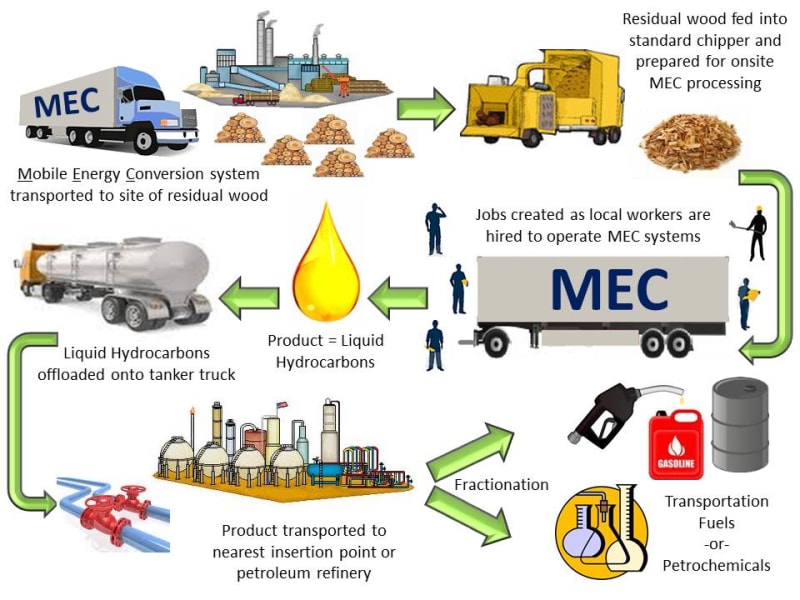We are in the sustainable energy business. By “taking the factory to the forest” we convert wood waste into liquid hydrocarbons from which refineries can make gasoline, diesel and aviation fuel.
Our Mobile Energy Conversion (MEC) systems enjoy a cost structure as much as 50% lower than competitive biofuel producers. A fully-operational MEC will transform at least 100 tons of standard wood chips into 11,000 gallons of sustainable liquid hydrocarbons per day.
The MECs will be owned and operated by ESN or its forest industry partners. In one year, each MEC can produce 4 million gallons of liquid hydrocarbons, worth more than $4.5M at current prices, and displace 100,000 barrels of imported crude.
Our forest industry partners turn a costly problem into a profit center; our refining industry customers can supply an unfilled market demand for “green” energy; our country and the communities where we operate (including the First Nations) enjoy enhanced economic development, a cleaner environment, and a global opportunity.
In five years, ESN plans to have 80 MECs in operation. MEC liquid hydrocarbons will be sold to existing refiners, who will produce renewable fuels that are chemical- and energy-equivalent to crude-oil derived fuels. They will command a premium price, yield 30% more transportation fuels than crude, and enjoy an assured market.
Unlike traditional fuels, MEC's produce a market-priced commodity with a sustainable and predictable cost profile. They are derived from abundant forest waste; are 'carbon negative' since they transform existing carbon into usable fuels; contain no harmful elements; and are fully compatible with the existing petroleum infrastructure.
We enhance reforestation through our char and water by-products, thus supporting higher CO2 uptake by young trees relative to mature stands. The ‘carbon sponge’ that MECs and new trees offer has a significantly broader geographic and environmental impact than any competing technology.
Capital costs are driven only by the volume consumed: expansion is achieved by deploying additional MECs (estimated at $3M each) and these generate enough revenue to pay for themselves within two years. The network has no single point of failure; hence we enjoy sustainable profitability without unplanned production interruptions.
ESN's lean green machines address a multimillion dollar market opportunity to the benefit of the timber and refining industries, the communities where they operate, and the global environment.
Like this entry?
-
About the Entrant
- Name:Jim Colthart
- Type of entry:individual
- Patent status:patented





